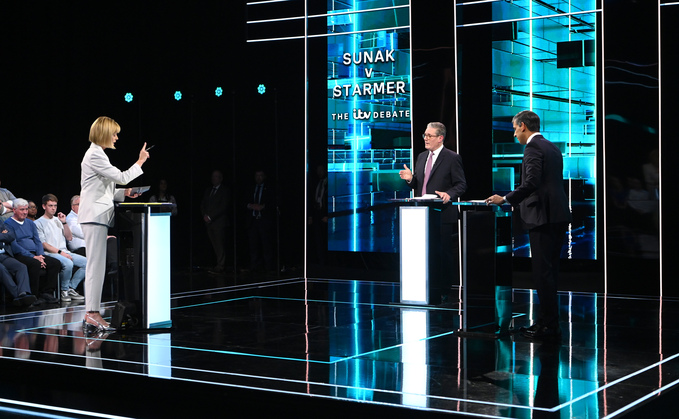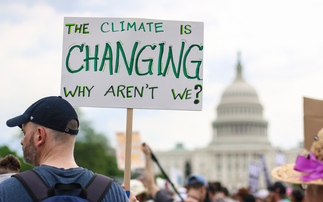
Credit: ITV
Rishi Sunak wants to reach net zero, he just wants to slow down efforts to get there - politicians and businesses that understand the benefits of climate action need to highlight the absurdity of the Prime Minister's stance
Last night's TV debate between Rishi Sunak and Keir Starmer put the deepest crack yet in the once sturdy political consensus on the urgent need to accelerate climate action. Where once there was broad agreement across party lines on the severity of the climate crisis and the economic gains that will result from tackling it, there is now an angry, petulant row over the wisdom of promoting clean technologies and deploying them as fast as possible. Worse still, this division is no accident, but rather the intended result of the Prime Minister's decision to talk up the costs of the net zero transition and ignore the benefits. Sunak will be happy that he last night damaged one of the few business success stories of the last few years, stoking unfounded fears that the public will be forced to spend money they don't have on expensive technologies they don't need.
Asked about how he would respond to the biggest long term challenge the world faces - a challenge that threatens to make swathes of the world uninhabitable, jeopardise global food security, and do deep and sustained damage to every economy on the planet - Sunak offered half a sentence of bromides on how his daughters are concerned about climate change, before immediately attacking clean technologies that he misleadingly insisted would cost households "thousands of pounds".
"Of course we are going to tackle climate change and get to net zero," he said. "But I don't think the British people should solve a global problem all by themselves, which is why I am also prioritising energy security and your bills… I am not going to impose thousands of pounds of costs on you to rip out your boiler, change your car, convert your home." He even challenged viewers at home to search online for new electric vehicles and heat pumps - technologies his government wants to see deployed at pace and scale, so as to help cut household's energy bills and ensure the country meets its climate targets - and marvel at how much they cost (luckily, they would find that many clean technologies are now close to cost parity with their polluting rivals and can save people thousands of pounds in lower running costs).
Sunak's comments are the latest step in the government's strategy of characterising the net zero transition as a cost to be minimised and a chore to be reluctantly undertaken, rather than an opportunity to be seized or a mission to be embarked upon. Sunak may have rejected Nigel Farage's calls for net zero targets to be scrapped, but he has happily embraced climate sceptic tropes about the potential cost of decarbonisation, ignored concerns about the impact of new fossil fuel projects, and failed to respond to warnings the UK is off track to meet its legally binding emissions goals. He has adopted this rhetorical gambit while making only a handful of policy changes that will have a negligible impact on costs for households that have spent years being rocked by soaring energy and food bills and flat-lining wages.
The question for those politicians and businesses that want to accelerate the UK's net zero transition is how to respond to the reductive and damaging narrative that is being advanced by the Prime Minister and seized upon by those within the Conservative Parties who would happily ally with Farage's Reform Party to scrap climate policies all together?
There are two complementary responses. The first is to forcefully rebut Sunak's argument on the substance. To highlight that far from the UK taking climate action on its own there is a treaty signed by almost 200 countries that have all committed to reaching net zero and transitioning away from fossil fuels. To demonstrate how his claim the government has saved households "thousands of pounds" by delaying a couple of climate policies is highly contested at best and deeply misleading at worse. To show that the original 2030 date for phasing out new internal combustion cars was designed to come well after the point at which fast chargers are ubiquitous and electric vehicles are at price parity with their fossil fuel counterparts. That there were never any rules requiring households to "rip out their boiler" and there is a whole suite of policies designed to curb the cost of green heating systems. That the only rules requiring people to improve the energy efficiency of their properties were focused on landlords who let out cold and damp homes.
The truth is there are a few policies that could push up costs for households in the near term, such as the system of levies on energy bills and the mandates for auto and boiler manufacturers to increase production of zero emission models. But the government has not scrapped these policies - the most it has done is delay the full introduction of the Clean Heat Market Mechanism - for which the cost impact will be marginal, and they will all help reduce long term costs by improving efficiency and curbing fossil fuel imports.
Sunak has not saved the average household thousands of pounds, but what he has done is slowed the clean tech transition, made the UK less attractive for green investors, and left the country more reliant on costly fossil fuel imports for longer. If Labour does reverse the policy U-turns made by Number 10 last autumn it will have no immediate impact on costs and will likely result in savings down the line as clean tech prices fall.
The second possible response to Sunak's attacks on net zero is to sketch out the macro-economic case for rapid decarbonisation. To argue, as Starmer did last night, that "we should not just see [the clean energy transition] as a challenge, it is a huge opportunity". To stress that "other countries have realised renewables are the future - they are in the race", and the UK should strive harder to be in the race too, especially when the US, EU, and China are all redoubling efforts to attract green investment.
Just like Farage, Sunak has never really been challenged on how he expects the UK to compete in a fast-decarbonising and increasingly climate-impacted world if it deliberately chooses to slow the roll out of clean technologies and underfund climate adaptation measures. There are legitimate concerns about the short-term cost implications of some low carbon technologies and questions about how the cost and benefits of the net zero transition are shared. But it is the responsibility of political leaders who genuinely take climate change seriously to navigate these challenges, not declare that it is all too difficult and we can afford to wait a few more years to act.
The truth is Starmer's attempts to advance these arguments were workmanlike at best. Hampered by a hugely frustrating format that asked leaders to engage with hugely complex issues in just 45 seconds and repeatedly interrupted by Sunak's barrage of dubious claims, he made it clear Labour would be more ambitious with its climate policies. But he largely failed to rebut the Prime Minister's scaremongering over the cost implications of decarbonisation, and more broadly he fell into the trap that 'if you're explaining, you're losing'.
The dispiriting exchanges left me wondering if there might be a third response that could disarm the Prime Minister's claims about the cost of decarbonisation, one that challenges the government to engage with the risks that come from slowing the pace of clean tech deployment.
Imagine if, instead of welcoming the policy dividing lines drawn by Sunak, Starmer had attempted to rebuild the consensus on climate action. "There's really not that much difference between our plans," he could have said, adopting a tone somewhere between statesmanlike and disappointed dad. "We both believe climate change is a grave threat that requires a serious response and we both think there are huge opportunities to be gained from investing in renewables and technologies that can bring down bills and make your homes warmer."
"The only difference," he could have continued, "is we think climate change is so serious and the economic opportunity and chance to cut bills so big that we want to go a bit faster than a government that keeps changing its mind. We've listened to businesses and the public and we know they want the UK to work with its allies to play a lead role in this global mission. Now, he'll say making this investment will cost people more, but that is simply not the case. Besides he wants to make the same investments and do the same things, just slower. And as we've seen over the past 14 years, if you keep putting off fixing things they just get worse and it ends up costing everyone more."
Such an approach would not work with those who recklessly want to scrap net zero policies altogether, but it would highlight the absurdity of a government that wants to simultaneously promote and badmouth clean technologies. This election has confirmed the political consensus on climate action is more fragile than at any point in decades. If Farage succeeds in his plan to hijack the Conservative Party it could soon be fractured completely. But maybe it is possible to rebuild some sense of shared responsibility by highlighting how everyone serious still accepts we need to reach net zero emissions, the disagreement is only about the pace at which we try to get there. And if we have to get there, all our competitors are trying to get there, and all the evidence shows that getting there will save us money, why would we want to slow down?
You can now sign up to attend the fifth annual Net Zero Festival, which will be hosted by BusinessGreen on October 22-23 at the Business Design Centre in London.










